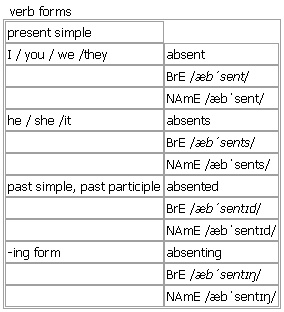 absent
absent

ab·sent adjective, verb
adjective BrE [ˈæbsənt] ; NAmE [ˈæbsənt]
1. ~ (from …) not in a place because of illness, etc
•to be absent from work
Opp: ↑present
2. ~ (from sth) not present in sth
• Love was totally absent from his childhood.
Opp: ↑present
3. showing that you are not really looking at or thinking about what is happening around you
•an absent expression
see also ↑absently
Word Origin:
Middle English: via Old French from Latin absens, absent- ‘being absent’, present participle of abesse, from ab- ‘from, away’ + esse ‘to be’.
Example Bank:
•He now played with a passion that had been strangely absent from his previous performance.
•He played with an abandon that was strangely absent from his performance last week.
•He was absent from work for two weeks.
•Local people were conspicuously absent from the meeting.
•soldiers who go absent without leave
verb BrE [æbˈsent] ; NAmE [æbˈsent] ~ yourself (from sth) (formal)
to not go to or be in a place where you are expected to be
• He had absented himself from the office for the day.
Verb forms: 
Word Origin:
[absent] Middle English: via Old French from Latin absens, absent- ‘being absent’, present participle of abesse, from ab- ‘from, away’ + esse ‘to be’.
|
|
